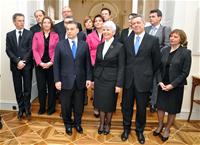Europe is ready for Croatia, but Croats still hesitate
Dessislava Dimitrova, February 10, 2011
 Croatia is moving more and more confidently towards its European Union membership and will most probably achieve its aim to wrap up the negotiation process by end-June. During his official visit to Zagreb on Tuesday, the Hungarian Prime Minister, Viktor Orban, made it clear that the country would get a date in April for completion of the accession talks.
Croatia is moving more and more confidently towards its European Union membership and will most probably achieve its aim to wrap up the negotiation process by end-June. During his official visit to Zagreb on Tuesday, the Hungarian Prime Minister, Viktor Orban, made it clear that the country would get a date in April for completion of the accession talks.
"March will be the month of success and in April a date has to be received for the end of the negotiations. If we do this now, the process of accession to the European Union will be prolonged", Orban said after his meeting with his Croatian counterpart Jadranka Kosor. He refused to comment how much the negotiations could be prolonged, arguing that this would become clear in April.
Kosor announced that by the end of the week Croatia would report to the European Commission on all the measures it had undertaken in relation to Chapter 23, which concerned, most of all, fight against corruption (Judiciary and Fundamental Rights) and that she expected a positive assessment from the Commission on the plan for the restructuring of the Croatian shipyards, the endorsement of which was a major requirement for Zagreb during the accession negotiations. “Our aim is to finalise the talks by the end of the EU six-month rotating presidency, currently held by Hungary. That is a historic, strategic and symbolic aim, which we want to achieve in the year, in which our country marks 20 years from its independence,” Kosor said.
Since ex-Yugoslavia fell apart, only Slovenia (from the former Yugoslav republics) managed to become a member of the European Union and even to introduce the euro as its national currency. Croatia is currently on its way to do this, while the rest of countries are on different stages on their path to a future membership. And while for the Croatian government joining the EU and the euro area is a primary goal (bolder analysts predicted last week that the country could become a member of the eurozone yet in 2013 if the accession negotiations end successfully), the Croatian voters are obviously not quite convinced in the advantages of membership.
According to a recent poll, conducted by a local pollster, even half of the Croats were not sure whether they wanted their country to join the EU. “Despite the optimistic forecasts on EU entry, a concrete membership date is still not set. It seems like every time we see a sign for Croatia's accession to the EU, somebody takes a rabbit out of the hat. The same way the Croatian citizens surprised us,” the pollster said, explaining the results from the survey.
The results show that in February some 40.3% of the respondents were against the EU membership (compared to 40.8% a month ago), while 10.2% were hesitating whether they were pro or contra. According to the pollsters, the opinion of some of the participants in the poll was impacted by the political campaign and by media, while some of them had become more skeptic because they were not sure what exactly would change in the coming months and years. A similar poll, carried out last month in Serbia, showed that the share of Serbian citizens who supported the EU membership fell to a record-low 57%.
But besides hesitating about the EU membership, Croats seem to be dissatisfied by the work of their government too, as the assessment of that indicator reached its lowest level since 2004, according to the study. Thus, it is neither Prime Minister Jadranka Kosor, nor her main political opponent Zoran Milanovc those who enjoy the highest voters’ support, but it is President Ivo Josipovic who took office in the beginning of last year. Former Prime Minister Ivo Sanader, who is currently in custody in Austria, following the biggest campaign in the fight against corruption, expectedly is the less liked Croatian politician. Although Kosor made a major cabinet reshuffle after the arrest of Sanader, obviously the move failed to help her win greater support from the citizens.
 Bakir Izetbegovic, Andrej Plenkovic | © Council of the EU
Bakir Izetbegovic, Andrej Plenkovic | © Council of the EU Aleksandar Vucic, Recep Tayyip Erdogan | © Serbian Presidency
Aleksandar Vucic, Recep Tayyip Erdogan | © Serbian Presidency Jean-Claude Juncker, Zoran Zaev | © European Commission
Jean-Claude Juncker, Zoran Zaev | © European Commission